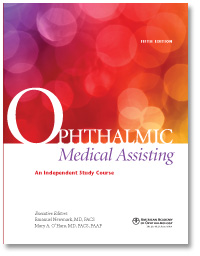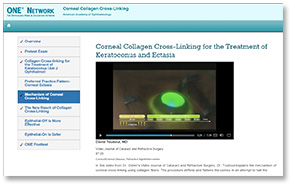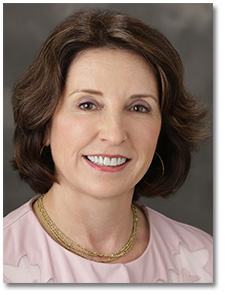Download PDF
WHAT’S HAPPENING
Ophthalmic Medical Assisting: Now an Interactive eBook
 |
| AN INDEPENDENT STUDY COURSE. Provide your staff with the most up-to-date training materials with this eBook for beginning ophthalmic allied health professionals. |
The classic Ophthalmic Medical Assisting textbook has been transformed into a comprehensive self-study program that combines these key resources into a single Academy eBook:
- Full text and images from the Ophthalmic Medical Assisting book.
- Video demonstrations from the Fundamentals of Ophthalmic Medical Assisting DVD—watch right from the eBook.
- 400+ self-assessment questions from the Certified Ophthalmic Assistant Exam Study Guide—create a customized self-assessment and receive test results instantly.
This new format allows your assistants to access these resources anytime, anywhere. The eBook can be downloaded to Apple iPad or Android tablets. To facilitate ease of use and enhance customized learning, it includes features like highlighting, note-taking, and bookmarks.
To purchase, visit www.aao.org/store.
TAKE NOTICE
EyeWiki Contest—Read the Four Winning Articles
EyeWiki is the Academy’s collaborative online encyclopedia where physicians, their patients, and the general public can view content written by ophthalmologists covering the spectrum of eye disease, diagnosis, and treatment.
In 2014, the Academy invited U.S. residents and fellows-in-training to submit articles to EyeWiki as part of a writing contest. The four winning authors won free trips to this month’s Mid-Year Forum in Washington, D.C.
- Aniruddha Agarwal, MD, Stanley M. Truhlsen Eye Institute at the University of Nebraska Medical Center, Omaha: Retinal Vasculitis
- Margaret L. Pfeiffer, MD, University of Texas Health Science Center at Houston: Enucleation
- Rahul S. Tonk, MD, MBA, Albany Medical College, Albany, N.Y.: Blepharitis
- Sarah H. Van Tassel, MD, Weill Cornell Medical College, New York: Optic Disc Hemorrhage
Now, international ophthalmologists are also able to participate via the International Ophthalmologist Contest. Submissions are being accepted until June 1.
To read the winning articles and submit to the International Ophthalmologist Contest, visit www.aao.org/eyewiki.
IRIS Registry Resumes Processing of New Users
If you registered for the IRIS Registry earlier this year, the Academy asked you to complete some paperwork and also notified you that it had temporarily stopped integrating new users. This month, the Academy will start processing new users again—and the earlier you return your paperwork, the closer you will be to the front of the queue.
Why clinical registries need an annual hiatus. Like most clinical registries that report data to regulatory programs, the IRIS Registry stops processing new users at the start of the year. To ensure that the data of existing users are submitted appropriately, significant time must be spent preparing the data for submission and adapting to changes in the rules.
Why you should participate in the IRIS Registry. By integrating your electronic health records (EHR) with the IRIS Registry, you can use the IRIS Registry to report in the Physician Quality Reporting System and to satisfy components of the EHR meaningful use program. Furthermore, you can use the IRIS Registry to review practice performance, manage patient populations, and more.
How to get started. Begin the sign-up process at www.aao.org/irisregistry.

ONE SPOTLIGHT: Improve your clinical knowledge with multimedia Learning Plans. Learning Plans are collections of ONE Network content selected by its editors. Each plan addresses a commonly misunderstood topic with courses, cases, videos, and journal articles to improve knowledge and build new skills. Titles of current Learning Plans include Corneal Collagen Cross-Linking, Pediatric Orbital Cellulitis, and Herpes Simplex Virus Keratitis.
To view, visit www.aao.org/learningplans.
|
Ask the Ethicist: The Impaired Colleague
Q: I am the medical director of an ophthalmic ambulatory surgery center (ASC). Recently, the operating room staff at the surgery center informed me that a colleague seemed inebriated. When I asked him to speak with me, it was clear that they were correct. Upon questioning, he confessed that he had been drinking. He has been suspended from our ASC. What are my obligations to report this to the hospital where he has privileges and to the wider community?
A: Your obligations are threefold: to assist your colleague, to protect patients and the community, and to notify the appropriate authorities.
Assist your colleague. Principle 6 of the Academy’s Code of Ethics states, “If a member has a reasonable basis for believing that another person has deviated from professionally accepted standards in a manner that adversely affects patient care or from the Rules of Ethics, the member should attempt to prevent the continuation of this conduct. This is best done by communicating directly with the other person. When that action is ineffective or is not feasible, the member has a responsibility to refer the matter to the appropriate authorities and to cooperate with those authorities in their professional and legal efforts to prevent the continuation of the conduct.”
Depending on the situation, a one-on-one conversation or an intervention conducted by several colleagues may be appropriate. An effective discussion would encourage the ophthalmologist to take advantage of numerous self-help programs and/or voluntary state medical board programs. If successful in one of these programs, the physician may be able to return to practice without public awareness of his issue. The credentials committee at your local hospital should be able to assist your colleague with finding an appropriate recovery program or a mentor certified by the state licensing board. Physician health programs may also provide an intervention facilitator who has been trained to work with impaired physicians.
Protect patients and the community. Rule 5 of the Academy’s Code of Ethics defines an ethical obligation to colleagues and the profession: “A physically, mentally or emotionally impaired ophthalmologist should withdraw from those aspects of practice affected by the impairment. If an impaired ophthalmologist does not cease inappropriate behavior, it is the duty of other ophthalmologists who know of the impairment to take action to attempt to assure correction of the situation. This may involve a wide range of remedial actions.”
Notify the appropriate authorities. If your colleague chose not to seek help or was not successful in his or her program, we recommend suspending operating privileges at the ASC. This should be done in writing with the input of the ASC’s legal representative. Close monitoring of this ophthalmologist’s patients on the day in question is important. Also, remember your duty to the larger patient community. Some states require the reporting of an impaired colleague, and failure to report can result in sanctions similar to those meted out to the impaired practitioner.
For more information, visit www.omic.com/incompetency-reporting-and-coverage. To read the Code of Ethics, visit www.aao.org/ethics.
The Academy’s Year in Review
The 2014 Year in Review: 19 Ways the Academy Is Supporting Your Education, Your Practice and Your Patients highlights the Academy’s educational, legislative, and practice management accomplishments over the past year. These include:
- Continued expansion and evolution of the ONE Network
- New PQRS designations for the IRIS Registry
- Enhanced patient education materials
- Increased accessibility of educational content around the world
Visit www.aao.org/yearinreview.
MEETING MATTERS
Discover Las Vegas
AAO 2015 takes place Nov. 14-17, with Subspecialty Day Nov. 13-14, at the Sands Expo/Venetian, which is within walking distance of casinos, restaurants, and a great variety of attractions. Known as the entertainment capital of the world, Las Vegas is home to hundreds of events, concerts, and shows featuring dancing, singing, acrobatics, and more.
For more information, visit www.aao.org/lasvegas.
Sneak Peek: 2015 Jackson Memorial Lecture
 |
| DR. COLEMAN. |
Anne L. Coleman, MD, PhD, will deliver the Jackson Memorial Lecture at the Opening Session of AAO 2015. Dr. Coleman is the Fran and Ray Stark Professor of Ophthalmology and a professor of epidemiology at UCLA, a glaucoma specialist at the Jules Stein Eye Institute, and the director of the UCLA Mobile Eye Clinic and Center for Eye Epidemiology.
Organizing a Meeting?
Would your alumni or ophthalmic society like to meet during AAO 2015 in Las Vegas? Hotel meeting space requests for Nov. 12-17 are now being accepted. Assignments will be made on a first-come, first-served basis. Request space early; fees increase after Aug. 18.
For details, including hotel options, meeting times, and processing fees, visit www.aao.org/meeting_space.
International Attendees
Update your travel documents for AAO 2015. Visa applications must be made no later than 90 days prior to travel. Travelers from countries participating in the Visa Waiver Program must complete an Electronic System for Travel Authorization application and receive notification of acceptance prior to departure.
For more information, visit www.aao.org/visa.
D.C. REPORT
Overview of 2015 Health Care Initiatives
The 114th Congress convened in January with an expanded Republican majority in the House and a new Republican majority in the Senate. The start of the new Congress also brought changes in the Republican and Democratic leadership rosters of several key health-related committees. These new dynamics will drive health care issues in 2015, but Republican leaders will still have to contend with President Obama as they pursue their ambitious agenda.
SGR. As Congress convened, one of its top health care priorities was to tackle the flawed Sustainable Growth Rate (SGR) formula, with a deadline of March 31. The SGR is used to calculate physician Medicare payments. At press time, organized medicine was advocating for permanent repeal of SGR or, if necessary, another short-term patch.
Other expected health care initiatives include the following:
Health reform. Republicans will continue their efforts to repeal the Affordable Care Act (ACA), but those efforts may largely be symbolic because they don’t have the votes to overcome a presidential veto. However, Republicans are likely to target provisions in the law that some Democrats also have opposed, such as the 2.3 percent excise tax on medical devices and the Independent Payment Advisory Board (IPAB), which is charged with making annual cost-cutting recommendations if Medicare spending exceeds a target growth rate. The physician community strongly supports the repeal of the IPAB.
A number of ACA provisions that have been delayed will be implemented in 2015, including the employer mandate. And 2015 will see the expiration of some key ACA programs such as the Community Health Center Fund. These items (and the outcome of the Supreme Court decision on subsidies to purchase coverage) could upend the new law implementation and are likely to spark conflict between Congress and the President.
Children’s Health Insurance Program. Funding for the Children’s Health Insurance Program (CHIP) expires at the end of September, and advocates are pushing for an extension of the law. CHIP currently covers 8 million children who live in families with incomes too high to qualify for Medicaid but too low to afford private coverage. Although vision care is an optional program, all state CHIP programs currently provide coverage for eye exams. However, when faced with budgetary pressures, states may limit or eliminate their vision coverage for children.
The 21st Century Cures initiative. This initiative by the House Energy & Commerce Committee seeks to promote medical innovation and speed new therapies to market. The committee leaders will be assessing many of the procedures along the drug and device delivery pipeline and looking for ways to improve them. These include funding for medical research, the process for approval of drugs and devices at the Food and Drug Administration (FDA), coordinating with the Centers for Medicare & Medicaid Services on coverage and reimbursement for medical innovations, and modernizing clinical trials.
MEMBERS AT LARGE
Texas Society Ensures a Focus on Future
The 2015 Mid-Year Forum (MYF) saw robust attendance from residents supported by the Texas Ophthalmological Association (TOA) as part of the Academy’s Advocacy Ambassador Program. “We are collaborating with our state’s training programs to ensure that residents get a seat alongside seasoned leaders while attending Congressional Advocacy Day and the MYF and that they have the chance to understand the importance of and participate in advocating for our patients,” said Sidney K. Gicheru, MD, TOA President.